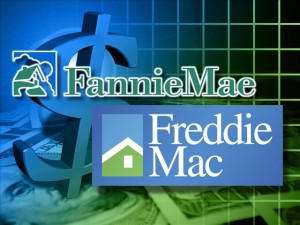
Pinto recently wrote an oped for the Wall Street Journal outlining his proposal, and also published a new forensic study explaining in indisputable detail how government policies, including those of Fannie Mae and Freddie Mac, the Department of Housing and Urban Development (HUD), and the Federal Housing Administration (FHA) helped to cause the crisis by weakening underwriting standards, lowering down payments, and generally degrading the quality of credit in the U.S.
“We got into this problem over 15 to 20 years through HUD, it’s going to take us time to get out of it because they’ve left us in a terrible mess. We need to back out of it just like one backs out of any alley,” Pinto said, explaining that it must be done “slowly and deliberately.”
Pinto noted that securities sold by Fannie Mae and Freddie Mac are only selling for a slightly higher rate than treasuries right now. “The spreads are narrow to Treasury because they’ve got the unlimited backing of the federal government. They’re not explicitly guaranteed by the federal government, but there is no limit on the amount of money that the Treasury can give to Fannie and Freddie to back them.”
Pinto said there would be little change in the spreads even if the Treasury did explicitly guarantee the securities issued by Fannie and Freddie, because investors have already priced in the guarantee. He also noted that rates on Ginnie Mae securities, which underwrite FHA loans, are nearly identical to Fannie Mae securities: “The fact that one has the full faith and credit of the government and the other has a contractual agreement that says the federal government will give an unlimited amount of money [then] the market considers those to be about the same thing.”
At a Treasury-hosted conference by financial industry leaders, Treasury Secretary Timothy Geithner said “I believe there is a strong case to be made for a carefully designed guarantee in a reformed system, with the objective of providing a measure of stability in access to mortgages, even in future economic downturns.”
Of course, that differed significantly from prior statements. In March he wrote to Congressman Scott Garrett that “By statute, all obligations and securities issued by the GSEs must include a statement that makes clear that such obligations and securities are not guaranteed by the United States and do not constitute a debt or obligation of the United States.”
Now, as Pinto predicted in his Journal oped, the Treasury appears to be moving in the direction of an explicit guarantee of securities. How would it work? “The way any guarantee works, usually, you’re guaranteeing the timely repayment of principal and interest. Which means that if the mortgage underlying the security is delinquent, you as the investor in the mortgage-backed security still get your payment when you’re supposed to.” Which is yet another taxpayer bailout, despite promises by the Obama Administration that the Dodd-Frank bill ended bailouts.
But what if there were no explicit guarantee? What if Treasury came forward tomorrow and said there would be no more bailouts on securities issued by Fannie and Freddie? “The government has said that whatever’s out there is covered,” Pinto said of the $5.5 trillion in mortgage-backed securities (MBS) Fannie and Freddie own or guarantee. In 2008, the companies were placed into conservatorship, effectively throwing the full faith and credit behind the securities they issued in all but name.
“They’re hard-pressed to undo that because they’ve already announced it. They have an agreement with Fannie and Freddie, that it has an unlimited amount [of backing] until the end of 2012, and then another $275 billion after that,” Pinto explained. “They could say we’re not going to allow Fannie and Freddie to issue any more securities but that doesn’t do anything about the ones that are already outstanding.”
That’s because while the Treasury’s credit expires at the end of 2012, that backing is currently unlimited. Whatever losses the companies experience between now and then, taxpayers will foot the bill, all without any appropriation by Congress. And then after that, as Pinto noted, they can get up to $275 billion extra for any further losses.
Pinto proposes “diminishing the size of Fannie and Freddie by reducing the maximum loan they can buy, which makes them become a smaller and smaller part of the market, which then allows the private sector to move in behind and build capacity” by absorbing new MBS.
But it won’t be easy. “They’ve gotten us into such a pickle here that it’s very hard to unwind it. It needs to be unwound, but it needs to be unwound slowly. They’ve created a mess through all this low-income housing,” he explained.
For comparison purposes, we asked hypothetically what if the Treasury sold Fannie and Freddie securities without any guarantee at all. “What Treasury could say is we’re going to start selling $1 trillion [of mortgage-backed securities] and there is no guarantee. Because Treasury’s the holder so they can wave it.”
However, he instead proposes that “market normalization should focus on new MBS issues rather undoing past issues,” which he said “will run off over time on their own.”
“You’ve got two issues,” he explained. “One is how quickly do they sell them because there’s a liquidity issue of if you put all $1 trillion on the market that’s going to result in one price. If they sold $50 billion every other week for a year that would be another.”
Pinto said that privately-issued securities, if they lacked the implied or explicit backing of taxpayers would “have to be at a higher rate. The problem with Fannie and Freddie was that they had insufficient capital because rates were too low.” Therefore, any new dealers of MBS would need to be able to cover the actual risk the securities pose without any government backing, as opposed to how the risk is currently disguised with government backing.
Pinto explained that if done without any government support, “an investor would demand a higher rate than normal, meaning if you’ve got an MBS that exists today that yields 5 percent net, and the investor wanted 6 percent, you’d have to sell them at a discount in order to get them to 6 percent.”
But, said Pinto, “not a tremendous discount, because rates have dropped in the meantime.” Because the Treasury assumed control of the companies when rates were above 5 percent, and they have since dropped, Pinto suggested that now would be a good time to begin unwinding the companies.
“Today is actually, in the scheme of things, a better time to [withdraw] than most. This is almost a gift to get down to 4 ½ percent. Nobody predicted it, nobody expected it.” He noted that “anything lower than 7 percent is lower than virtually the entire time in the last 37 years except for a couple of years.”
Pinto said that even if rates went up to 5 ¼ percent as government began withdrawing, “that’s what everybody was happy with six months ago. 5 ¼ percent was considered a very good rate.”
So, better for the government to begin withdrawing now from the housing market, when the nation is at the bottom of the market. Pinto foresees perhaps a ¾ to 1 percent increase if such a withdrawal began now, but only “if you do it slowly and in a measured way.” He suggested that it might start out closer to 1 percent, but would shrink to about ½ percent, “which, given all of the risks that you have [with] a government guarantee, it’s a small price to be paid.”
Given the choice, the American people would without a doubt opt for a more sound credit system that is properly capitalized because risk was properly assessed. “As soon as you start having price controls on things, which is what we do with interest rates, it makes it very hard, it makes it political. Interest rates should not be political, they should be market-based.”
Is it worth having the government jeopardize the entire economy just to have slightly lower interest rates? Pinto said that those slightly lower rates are “the best they offer, and the worst is you basically build systemic risk into the system because you have so many weak loans from borrowers who have no skin in the game, and the government is pushing the exact buttons that they pushed last time which got us into this mess.”
Alternatively, Pinto advised that the economy could be on much sounder footing if Fannie and Freddie were unwound. “I happen to be in the school that says, if you’re an alcoholic, the first thing you have to do is stop taking the next drink. We have to wean the market off of high leverage, low down payment loans, and we’ve done the exact opposite. We haven’t allowed the market to get to a natural level.”
Pinto added, “The problem is that we’ve been running the system with inadequate capital, both on the part of the home buyer, who had insufficient skin in the game, the down payments are too low, and on the part of the investors in the system, Fannie and Freddie and everybody else had too little capital in the system to make it robust.”
To address the lack of capital in the system, Pinto opined that “you then have to have a return on capital, which is how you get compensated for putting capital at risk. And so, you’d have to have higher interest rates” both on securities and the mortgages they back.
With sales of existing homes plummeting, along with prices, over 14 million unemployed Americans, and consumer spending slowing, all despite the Federal Reserve’s near-zero interest rate policy, monetary stimulus, and Congress’ fiscal stimulus, now is the time consider tried and true methods of thrift and savings to help the economy recover on more solid footing.
There is, after all a choice — an alternative to an ever-expanding government place in the marketplace. Market-based interest rates, as opposed to artificially lowered rates by government, can be used to begin squeezing the risk out of the system and to recapitalize.
And Fannie and Freddie can be unwound, larger down payments can be required, and banks can stop issuing and underwriting risky loans. And it need not be done with taxpayer backing in the future. As Pinto wrote in his Journal piece, “the road to housing hell may have been paved by the government, the road back will be built by the private sector.”
Robert Romano is the Senior Editor of Americans for Limited Government (ALG) News Bureau.






